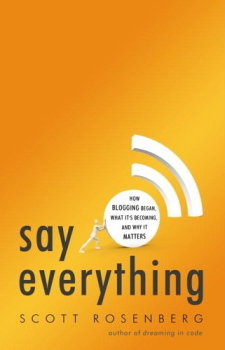Last Day to Enter Television Death Pool
Today's the last day to enter the Ted Marshall Open Television Death Pool, a contest to predict the shows most likely to be cancelled during the fall TV season. To play, you must predict 10 comedies, dramas, games shows or news programs on the five major networks -- ABC, CBS, CW, FOX and NBC -- that will be cancelled by Aug. 31, 2010.
Last year I finished in a tie for 24th place by picking eight shows that went to their doom:
ER(NBC)- 90210 (CW)
Opportunity Knocks(ABC)- The Mentalist (CBS)
Life On Mars(ABC)Privileged(CW)Eli Stone(ABC)Easy Money(CW)My Own Worst Enemy(NBC)The Ex List(CBS)
My biggest miss was The Mentalist, the cop drama with Simon Baker playing a former fake psychic who uses his keen powers of observation to fight crime. The show was an enormous hit, averaging 15.9 million viewers, and one of the top 10 shows of the entire season. I also missed on 90210, a show I'm ashamed to admit I watched four times.
This year, I'll be blogging about the contest and the new TV season on Mister Television, a new blog I'm launching with Television's Jonathan Bourne.
KCRA Journalists Giddy After Child Kidnapper's Call
Phillip Garrido, the 58-year-old sex offender in California accused of kidnapping Jaycee Dugard as an 11-year-old in 1991 and being the father of her two children over the years she was held in captivity, called Sacramento TV reporter Walt Gray yesterday.
During the call, Garrido urged Gray to pick up a document from the FBI that will explain his actions. "Wait until you hear the story of what took place at this house," he said. "If you take this a step at a time you're going to fall over backwards and in the end, you're going to find the most powerful heart-warming story."
KCRA ran the full audio of the call, but they made a mistake and kept the recording going for some conversation between Gray and others in the newsroom.
After the call with Garrido ends, the following conversation takes place:
Woman's voice: Save it. You gotta save it.
Man: You know what you're doing?
Walt Gray: Yep.
Man: Alright. Don't mess up.
Gray: This is the biggest moment of your life.
Woman: And yours.
Hearing that audio is like catching Harry Potter and Hermione Granger discussing spellcasting among muggles.
Little-Known Blogger Got William Calley Scoop
You may have heard last week that Lt. William Calley, for the first time ever, publicly apologized for his role in the 1968 My Lai massacre, in which 350 to 500 Vietnamese -- mostly unarmed women and children -- were killed by U.S. troops under his command. Calley was sentenced to life in prison for 22 murders, but his sentence was commuted by President Nixon to three years of house arrest.
During an Aug. 19 speech at the Columbus, Ga., Kiwanis Club, Calley said, "There is not a day that goes by that I do not feel remorse for what happened that day in My Lai. I feel remorse for the Vietnamese who were killed, for their families, for the American soldiers involved and their families. I am very sorry."
This story was the exclusive scoop of a blogger, but when Associated Press ran its story on Calley's apology, it used the blogger's quotes without crediting him.
Dick McMichael, a retired broadcast journalist, was one of 50 people in attendance at the Kiwanis Club when Calley made a short speech and answered questions. McMichael wrote about the appearance on his blog, a personal site that primarily covers Georgia and Alabama topics. No professional media were present.
Calley refuses to talk to the media, so all of his quotes from the AP story came from McMichael, but he isn't credited. Instead, AP cited the Columbus Ledger-Enquirer, which asked McMichael to write up the story for the paper after it found out about his incredible scoop.
I'm not clear on whether AP had the legal right to run McMichael's quotes or anything else from his story. The wire service can legally make use of the copyrighted work of local newspapers that belong to the organization, but his byline is "Special to the Ledger-Enquirer," which means that he wrote it as a freelancer.
Last year, a site that I publish, the Drudge Retort, was embroiled in a copyright battle with AP over 33- to 79-word snippets of AP articles that were posted by users on the Retort. We resolved the matter amicably, but in a phone call with me, AP's attorneys took an extremely narrow view of fair use when it came to the headlines and leads from its stories. AP maintained that any verbatim quote of its headlines or leads is a copyright violation.
One of the ironies of that conflict -- and the aggressive stance AP has continued to take since then -- is that the wire service has an extremely expansive view of its own reuse rights. AP regularly turns the work of local newspapers into wire service stories without giving the originating reporter or newspaper any credit at all -- something we grumbled about when I was a reporter at the Fort Worth Star-Telegram in the '80s. AP also runs photos of people in the news copied from places like Facebook and MySpace without permission and can be stingy about crediting anyone else for breaking news.
In this case, McMichael's role in bringing Calley's remarks to light was an important element of the story wrongly omitted by AP. McMichael got one of the biggest scoops of the year -- reporters have tried for decades to get Calley to talk, and when he finally did we were fortunate a blogger was in attendance. Some other media outlets did credit him, including reporter Ernie Suggs in the Atlanta Journal-Constitution:
The appearance might have gone unnoticed, if not for Dick McMichael, a retired journalist who now blogs in Columbus. McMichael attended the meeting, blogged about it and his story was picked up by the Columbus Ledger-Enquirer.
"The questions were asked respectfully and politely, which could give the impression they were softball," McMichael blogged later. "I don't think that was the case. The questions got right to the crux of the matter, in my view, and Calley didn't dodge any of them."
Rewatching 'Ferris Bueller's Day Off'
"I did not achieve this position in life by having some snot-nosed punk leave my cheese out in the wind." -- Dean of Students Ed Rooney
 In 1965, an outdoor amphitheater was built in Anastasia Island, Florida, to celebrate the 400th anniversary of St. Augustine. The site, which was part of a state park, had been a coquina quarry used centuries earlier to build the city. The amphitheater was open 10 weeks each summer for performances of Florida's official state play, Cross and Sword, which lasted 31 years until the state decided it wasn't worth $27,000 to keep going.
In 1965, an outdoor amphitheater was built in Anastasia Island, Florida, to celebrate the 400th anniversary of St. Augustine. The site, which was part of a state park, had been a coquina quarry used centuries earlier to build the city. The amphitheater was open 10 weeks each summer for performances of Florida's official state play, Cross and Sword, which lasted 31 years until the state decided it wasn't worth $27,000 to keep going.
Since that closed, the St. Augustine Amphitheatre has been upgraded into a 4,500 seat outdoor concert venue that occasionally hosts free showings of classic movies. We took the kids last night to see Ferris Bueller's Day Off at the amphitheater, figuring they were now old enough to appreciate the angst-ridden teen comedies of John Hughes.
Ferris holds up pretty well after 23 years and is still funny, particularly the scenes involving Jeffrey Jones as Dean Rooney. I loved the film as a 19-year-old in Hughes' target market, but now that my struggles of adolescence are old enough to have adolescents of their own, I thought the story held up. Hughes was the poet laureate of the 'burbs.
I noticed a few new things this time around. Near the end, Ferris recaps the marvels of their day by telling his friends, "We ate pancreas." This line, which refers to their lunch at the snooty French restaurant, is about a deleted scene, according to IMDB:
Ferris orders something in French on the menu, and after everyone at the table tastes it, he is informed by the snooty waiter that he ordered "sweetbreads", which is a French dish made from the thymus gland. It was removed because it showed the waiter getting the better of Ferris ...
Also, Ferris complains repeatedly about not owning a car, but he has an expensive music synthesizer in his room he uses to simulate coughing. IMDB states that it's a E-MU Emulator II that cost around $8,000 in 1984. That buys a lot of crappy first cars -- my 1966 Dodge Dart cost me $500.
The crowd loved the movie, applauding the last scenes of Cameron, Sloane and Ferris. They also applauded enthusiastically at the cameo by Charlie Sheen as the teen druggie at the police station. The popularity of Two and a Half Men has turned Sheen from being a former drug- and sex-addicted manwhore to America's most beloved former drug- and sex-addicted manwhore.
Annie Leibovitz May Lose Copyright to Photos
New York magazine has an interesting story about how photographer Annie Leibovitz has made such a disaster of her finances that she may lose her homes and the copyright to all her work. She's made millions while accumulating millions more in debt. Here's one of the craziest anecdotes about her profligate spending:When [her daughter] Sarah started eating solid food, a rigorous journaling policy was instituted, in which every bite and bowel movement was to be committed to an unlined black notebook purchased from the Swedish stationer Ordning & Reda. Kellum regularly ordered replacement books from Stockholm so that the journaling could easily continue from one book to another. Once, when an order got lost in customs, Leibovitz insisted on having two notebooks sent from Stockholm via a special type of courier service called "quicking." It was essentially like buying a seat for a parcel on the next plane. The shipping cost alone came to $800.
The cheapest black notebook I could find on Ordning & Reda's web site sells for around $23 dollars (169 Swedish kronar).
Scott Rosenberg's 'Say Everything' Covers Blogs and 9/11
I'm currently reading Scott Rosenberg's Say Everything, his new history of blogging that digs deeply into the origins of the medium and why it has become so successful. Rosenberg, a founder of Salon.Com and an online acquaintance of mine for many years, has written a fascinating book that begins with chapters on early web diarists and bloggers such as Justin Hall, Jorn Barger and Joshua Marshall.
 The introduction to Rosenberg's book centers on how bloggers covered the 9/11 attacks, an important moment in the early history of the medium. He mentions that one of the first blogs to break the news was MetaFilter:
The introduction to Rosenberg's book centers on how bloggers covered the 9/11 attacks, an important moment in the early history of the medium. He mentions that one of the first blogs to break the news was MetaFilter:
At 8:58 a.m., Metafilter, a popular group blog, posted a link to a one-line news bulletin on the front page of the CNN web site, but CNN did not yet have a full story posted.
I was reading MetaFilter when TV networks reported that a plane had struck the World Trade Center, so I made one of three front-page posts that appeared on MetaFilter within two minutes of AP's first news alert. In my haste, I posted that a plane had struck the World Trade Center in Chicago. MetaFilter publisher Matt Haughey removed my post quickly and saved me from considerable shame, but you can still see a comment that documents my egregious mistake: "Just as an FYI, it's New York City, not Chicago."
So let the history books show that I was there for a pivotal moment in the history of blogging -- spreading false information.
On the next page, Rosenberg mentions a story New York Times reporter Amy Harmon wrote that day about how people were using the web during the attacks. Harmon quoted me about a mailing list I started that morning:
"This unfathomable tragedy reminds me of the original reason the Internet was invented in 1969 -- to serve as a decentralized network that couldn't be brought down by a military attack," said Rogers Cadenhead, who said he set up the WTCattack list because most of the Web sites reporting news had ground to a halt. "Amateur news reporters on weblogs are functioning as their own decentralized media today, and it's one of the only heartening things about this stomach-turning day."
The mailing list is still archived on Yahoo, but I've never gone back and reread the early messages. The attacks brought a bunch of new bloggers into the medium who covered terrorism and Islamic extremism and favored an aggressive pre-emptive U.S. military response to the attacks. They soon were dubbed warbloggers, and among the most prominent were Glenn Reynolds of Instapundit, Charles Johnson of Little Green Footballs and Andrew Sullivan.
I'm Thinking About Sex at This Very Moment
 We're having a discussion on the Drudge Retort about how often men and women think about sex. Member2586 commented that "Rudov is right, women are as interested or even more interested, in sex as men are."
We're having a discussion on the Drudge Retort about how often men and women think about sex. Member2586 commented that "Rudov is right, women are as interested or even more interested, in sex as men are."
He's quoting Marc Rudov, a self-described "antifeminist" who writes often about how men are getting the short end of the stick on issues like child support, alimony and relationships. Rudov's written a book with the full-of-win title Under the Clitoral Hood: How to Crank Her Engine Without Cash, Booze, or Jumper Cables. The book offers advice on "how to know in advance she'll be safe for you, compatible with you, and have real orgasms -- so you don't waste your time." I'd like to buy a copy to leave at someone's house in a conspicuous place right before he hosts a big gathering.
I'm surprised that some Retort users disagree with the idea that men think about sex significantly more often than women. A 2004 survey found that 43 percent of men think about sex several times a day compared to 13 percent of women. Seventy percent of men think about it at least once a day, compared to 34 percent of women.
Men also have more sex partners. A 2007 survey found that 29 percent of American men reported 15 or more sexual partners in a lifetime, compared to 9 percent of women.
Perhaps I'm a sad freak who's been using the Internet too long, but I don't think I've gone a day without thinking about sex since the first time I saw Lynda Carter in her satin tights fighting for your rights.

